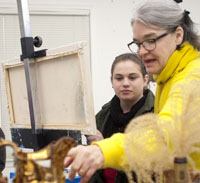Why I Give: Q&A with Christina Hua '11

Christina Hua '11
1. Why did you decide to attend the College?
I was born and raised in China, and I have always wanted to pursue higher education in the United States. I learned about the College through reading about the American author Pearl S. Buck, who lived in my hometown Huai'an when she first moved to China. As I researched Randolph College, I became drawn to its broad liberal arts education, exceptional faculty, and close-knit community.
Although I was unable to visit the College’s campus prior to attending, I was warmly received by the Admissions Office, particularly Ms. Joy McGrath, who was incredibly helpful and responsive to my questions. Her warm and thoughtful responses helped reduce my anxiety about attending college in the United States and were reflective of the welcoming community at Randolph College.
I decided to attend Randolph College and was fortunate to receive a generous scholarship offer, which made attending college in the United States financially possible.
2. What did your education and experiences at the College mean to you? Was there any one experience, professor, or memory that stands out as being pivotal or life-changing for you?
My education and experiences at Randolph College were truly life-changing. The rigorous liberal arts education helped me learn how to read critically, write cogently, and think broadly through exploring issues and ideas across the humanities, arts, and sciences.
As a non-native English speaker, I appreciated the College’s focus on writing skills and assistance provided by the Writing Lab. This training helped me become one of the best writers in my class at Columbia University, where I later earned my master's degrees in psychology and strategic communications.
I have many fond memories of Randolph College, from the Odd class traditions to the gorgeous campus behind the Red Brick Wall. I made lifelong friends and had the opportunity to work with wonderful professors who went above and beyond to help me learn and grow. My mind was expanded exponentially, and my life truly became Vita abundantior.
One of the most pivotal experiences of my time at Randolph College was working with
Dr. Dennis Goff, the chair of the psychology department, in the Summer Research program during my junior year. This experience provided me with extensive research experience and helped me hone my scientific research skills. Dr. Goff's guidance, patience, and pursuit of academic rigor were instrumental in my decision to major in psychology at the College and pursue graduate studies in it.
3. Why do you give to Randolph College? What does it mean to you to be a leadership supporter and member of the Conway Society?
I give to Randolph College because I am forever grateful for the financial support the College gave me and opportunities it afforded me. I believe it is my responsibility to give back so that the College can continue to educate and inspire future generations.
4. In what ways did your experiences at the College prepare you for life after graduation and/or for success in your career?
The liberal arts education I received at Randolph College prepared me for life after graduation and success in my career in management consulting. I learned to think critically and write clearly, and I was challenged to consider not only how to solve problems, but also which problems to solve and why. These skills are essential for success in any field, but they are especially valuable in management consulting, where the ability to think strategically and creatively is essential.
5. Tell us a bit about your career path/trajectory. Also, if you have thoughts on where you’d like to go in the next 5-10 years of your career, we’d love to hear about that, too. Did the education you received at the College prepare you for this and, if so, how?
I graduated from Randolph College with honors in 2011 and went on to earn an M.A. in Social-Organizational Psychology and an M.S. in Strategic Communications from Columbia University. I am currently a Senior Manager in human capital management consulting at Ernst & Young, and I am on track to become one of the first Chinese female partners in our New York practice in the next 3-4 years.
I am passionate about mentoring and coaching junior professionals, and I have been actively engaged in these activities since I joined Ernst & Young. I plan to continue doing so for the rest of my career.
I believe that my education at the College prepared me well for my career in management consulting. The liberal arts education I received taught me how to think critically and solve problems, and it also gave me the skills I needed to build relationships with clients and colleagues.
In the next 5 to 10 years, I hope to continue to grow my career in consulting and to make a positive impact on the lives of others. I also plan to continue mentoring and coaching junior professionals, and I hope to inspire them to reach their full potential.

